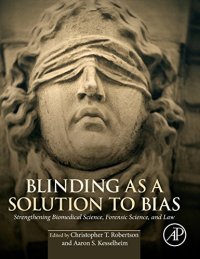
Ebook: Blinding as a Solution to Bias. Strengthening Biomedical Science, Forensic Science, and Law
- Tags: Biomedical engineering, Forensic sciences, HEALTH & FITNESS, Holism, HEALTH & FITNESS, Reference, MEDICAL, Alternative Medicine, MEDICAL, Atlases, MEDICAL, Essays, MEDICAL, Family & General Practice, MEDICAL, Holistic Medicine, MEDICAL, Osteopathy
- Year: 2016
- Publisher: Academic Press
- City: Boston, Amsterdam
- Edition: 1
- Language: English
- pdf
What information should jurors have during court proceedings to render a just decision? Should politicians know who is donating money to their campaigns? Will scientists draw biased conclusions about drug efficacy when they know more about the patient or study population? The potential for bias in decision-making by physicians, lawyers, politicians, and scientists has been recognized for hundreds of years and drawn attention from media and scholars seeking to understand the role that conflicts of interests and other psychological processes play. However, commonly proposed solutions to biased decision-making, such as transparency (disclosing conflicts) or exclusion (avoiding conflicts) do not directly solve the underlying problem of bias and may have unintended consequences.
Robertson and Kesselheim bring together a renowned group of interdisciplinary scholars to consider another way to reduce the risk of biased decision-making: blinding. What are the advantages and limitations of blinding? How can we quantify the biases in unblinded research? Can we develop new ways to blind decision-makers? What are the ethical problems with withholding information from decision-makers in the course of blinding? How can blinding be adapted to legal and scientific procedures and in institutions not previously open to this approach? Fundamentally, these sorts of questions―about who needs to know what―open new doors of inquiry for the design of scientific research studies, regulatory institutions, and courts.
The volume surveys the theory, practice, and future of blinding, drawing upon leading authors with a diverse range of methodologies and areas of expertise, including forensic sciences, medicine, law, philosophy, economics, psychology, sociology, and statistics.
- Introduces readers to the primary policy issue this book seeks to address: biased decision-making.
- Provides a focus on blinding as a solution to bias, which has applicability in many domains.
- Traces the development of blinding as a solution to bias, and explores the different ways blinding has been employed.
- Includes case studies to explore particular uses of blinding for statisticians, radiologists, and fingerprint examiners, and whether the jurors and judges who rely upon them will value and understand blinding.